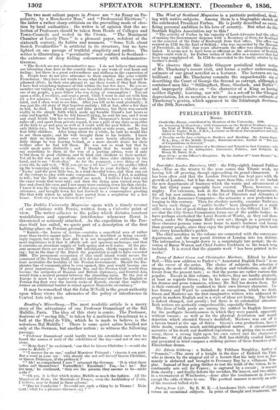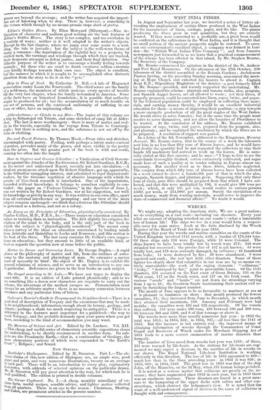PUBLICATIONS RECEIVED.
Bemis.
Cambridge Essays, contributed by Members of the University. 1856.
On Poisoning by Stryehnia ; with Comments on the Medical Evidence given at the Trial of William Palmer for the Murder of John Parsons Cook. k Alfred S. Taylor, M.D., F.R.S., Lecturer on Medical Jurisprudence and Che_ rnistry in Guy's Hospital.
A Treatise onthe Law relating to Bankers and Banking. By James Grant, M.A., Esq., of the Middle Temple, Barrister-at-law, Author of " The Las of Corporations in General."
Modern Greece : a Narrative of a Residence and Travels in that Country; with Observations on its Antiquities, Literature, Politics, and Religion. By Henry M. Baird, M.A.
Rosa Grey; or the Officer's Daughter. By the Author of " Anne Dysart," Li, In three volumes.
Post-Office London Directory, 1857: the Fifty-eighth Annual Publica- tion.—True as the winter to the year comes this Titanic work, not having left off growing, though approaching its grand climacteric. It has been often said that the London Directory has kept pace with the growth of London; but it has done more than this, even if we include the new departments of business which the wants and advancement of the last thirty years especially have created. These, however, are mighty. For extension, look at the Banking and Postal departments; for all but new entities, turn to the list of Directors and Actuaries of Fire and Life Assurance Companies—the actuaries a new profession be- longing to this century. Then for absolute novelty, examine Railways; nor have such things as " public berths" been altogether at a stand- still—what a list of good things for distribution is the Official List ! We
see that the City Sewer Commission forms one of' the public bodies : we have perhaps overlooked the Local Boards of Works, as they call them-
selves, under Sir Benjamin Hall's new act; though in a general way these obscurer persons come more home to men's business and bosoms than greater people, since they enjoy the privilege of dipping their hands into every householder's pocket.
The chief novelties in the volume are connected with the conveyance department, and the new postal division of London into ten districts. The information is brought down to a surprisingly late period; the ele- vation of Baron Watson and Chief Justice Cockburn to the bench being included. It is stated that the gigantic work " has been printed in fire weeks."
Poems of Robert Green and Christopher Marlowe. Edited by Robert Bell.—This new addition to Parker's " Annotated English Poets " is one of the rarest of the series. The choice of subjects, the selection of images, the mode of thinking, the diction and versification, are all dif- ferent from the present taste ; so that the poems are rather curious than popular. Except in this volume, we believe, they are hardly attainable, at least as regards Green ; for in his case they are scattered through his dramas and prose romances whence Mr. Bell has drawn them. her is their curiosity merely confined to their own literary character. Un- less Surrey and Wyatt be considered as exceptions, which we doubt, Green and Marlowe are the first imaginative writers who addressed the people in modern English and in a style of ideas yet living. The fashion is indeed changed, and greatly; but there is no substantial alteration. Both writers are perfectly comprehensible, especially Green. The lives of both poets are among the saddest in English literature for the profligate licentiousness in which they were passed, apparently without excuse ; as well as for the physical destitution and mental dejection which attended Green's deathbed ; Marlowe was cut off in a tavern brawl at the age of thirty. Green's own productions, there is little doubt, contain much autobiographical matter. A circumstantial narrative of his death and deathbed repentance, by giving rise to contro- versy, threw a strong light upon his own career and the character of Marlowe. Of all these materials Mr. Bell has skilfully availed himself, and presented in brief compass a striking picture of these founders of the Elizabethan drama.
Sir _Edwin Gilderoy : a Ballad. By Feltham Burghley, Author of " Sonnets."—The story of a knight in the days of Richard the First, who is shown by the magical aid of a hermit that his lady love in Nor- mandy is abducted and brought to Pevensey Bay by a villanous Tem- plar. Instead of first going thither to test the truth of the vision, he in- continently sets sail for France ; is captured by a corsair ; is rescued from slavery ; and finally defeats the ravisher, Sir Amyot, and two others, in a tournament at Winchester,—done after the tournament in Ivanhoe, except the odds of three to one. The poetical manner is merely an echo of the received ballad style. Poetry from Life. By E. M. H.—A handsome little volume of elegant verses on occasional subjects. In point of thought and treatment, the
pieces are beyond the average ; and the writer has acquired the import- ant art of knowing when to atop. There is, however, a something in the verses which though by no means prosaio stops short of pastry.
Lilian's Golden Hours. By Eliza Meteyard (Silverpen).—Nice de- lineation of character and uniform good writing are the best features of Lilian's Golden Hours. The story is too complex, and too overladen in a variety of ways ; neither is it well adapted to the writer's objects. Except in the last chapter, where we jump over some years to a wed- ding, the tale is juvenile ; but the subject is the well-worn theme of many a romance—the deprivation of the rightful heir to a property by wicked men, the turnings and windings through which they are tracked, their desperate attempts to defeat justice, and their final detection. One didactic purpose of the writer is to encourage a kindly feeling towards animals ; for those who are cruel to dumb creatures seldom entertain rely kindly feelings towards their own race. The object is excellent, but the manner in which it is sought to be accomplished often distracts attention from the story to fix it on the "pets."
Help in Time of Heed. By Catherine D. Bell.—A talc of Huguenot persecution under Louis the Fourteenth. The chief actors are the family of a nobleman, the members of which undergo every species of trouble till the very last chapter, when the family is reunited in America. Some of the facts have an historical foundation; it is possible that authority might be produced for all ; but the accumulation of so much trouble on one set of persons, and the continued uniformity of suffering in one form or other, have an unpleasing effect.
Aldershottana ; or Chinks in my Hut.—The topics of this volume are a trip to Sebastopol via Trieste, and some sketches of camp life at Alder- shot. The last is mere wordmongery : there is more of matter and real- ity in the travels, especially in the voyage from Trieste to Constanti- nople ; but there is nothing new, and the substance is not set off by tfie form or clothing.
Pen and Pencil Pictures. By Thomas Hood.—Prose tales and sketches, intermingled with poetry. Feeling, with perhaps a latent under-current of genius, pervades many of the pieces, and more visibly in the poetry than the prose. But the greater part of the book is wild and crude, running too often into the turgid.
How to Capture and Govern Gibraltar : a Vindication of Civil Govern- ment against the Attacks of the Ex-Governor, Sir Robert Gardiner, in his secret and unlicensed Report, recently put into circulation.—A virulent anonymous attack upon Sir Robert Gardiner; got up, apparently, in the Gibraltar smuggling interest, and calculated to repel dispassionate readers, by the tiresome repetition of abusive language with which its parade of blue-book research is interlarded. One of the imputations, hazarded without knowledge, it belongs to ourselves explicitly to con- tradict : the paper on " Fortress Colonies," in the Spectator of June 7, was not written by Sir Robert Gardiner, nor at his suggestion, nor with his knowledge or privity in any way. It was written in our own office, apart from all external interference or prompting : and our view of the main subject remains unchanged we think that a fortress like Gibraltar should be governed as a fortress, and not as a colony.
An Essay on the Principles of Education, physiologically considered. By Charles Collier, M.D., F.R.S., &c.—Three essays on education considered rather as training than as instruction. The first slightly investigates the relation of the mind to the body, and is the only part of the book in which the subject is "physiologically considered." The second essay takes a survey of the ideas on education entertained by leading minds from Aristotle and Quint ilian to Locke and Rousseau; and this section is the best of the three. The last essay contains Dr. Collier's own sugges- tions on education; but they amount to little of an available kind, at least as regards the question now at issue before the public.
Matter its Forms and Governing Laws. By George Duplex.—A rapid glance at the philosophy of matter and life, from the outlines of astro- nomy to the anatomy and physiology of man. So extensive a survey must of necessity be brief : the object of Mr. Duplex is to exhibit the general relations of science, and to serve as an introduction to any one in particular. References are given to the best books on each subject.
The Gospel according to St. Luke.—We have not types to display the exact title. It is an edition of Luke printed phonetically; and as we see something like a dozen new characters are requisite to carry out the scheme, the advantage of the method escapes us. Pronunciation must always be an arbitrary matter ; there is no necessary connexion between utterance and any particular form of letters.
Cockrem' s Tourist's Guide to Torquay and its Neighbourhood.—There is a good deal of description of Torquay and the excursions that may be made m Its neighbourhood ; information enough about its botany, geology, and climate ; perhaps a shade too much respecting its antiquities. There is a deficiency in the features most important for a guidebook—the way to reach Torquay, and the probable demands upon your purse when you get there, according to the kind of accommodation you may want.
The Museum of Science and Art. Edited by Dr. Lardner. Vol. XII. —This cheap and useful series of elementary scientific expositions closes the undertaking, to be shortly recommenced in another form. Its sub- jects are the Preadamite Earth,—that is, a continuation of Geology, the more elementary portions of which were expounded in "the Earth's Crust" ; Eclipses ; and Sound.
NEW SERIALS.
„Rutledge's Shakespeare. Edited by H. Staunton. Part I.—The ob- vious claims of this new edition of Shakspere are, an ample size, good Paper and print, and very numerous illustrations, twenty on an average to each part. There will be an introduction to every play, explanatory foot-notes, with addenda of selected opinions on the particular drains. hit. IL Staunton will pay great attention to the text, for which task he is yell qualified. The edition is printed in double columns.
The Corner Cupboard. No. I.—A cheap monthly miscellany of cu- rious facts, useful recipes, sensible advice, and lighter matter collected from all quarters. There is an eye to the season : Christmas, Skating, and Cakes, are prominent articles in the present number.

































 Previous page
Previous page